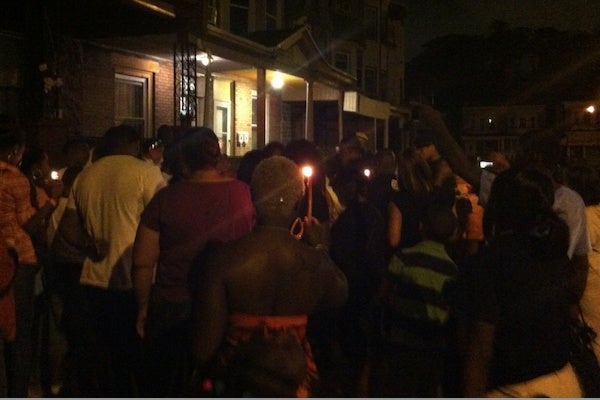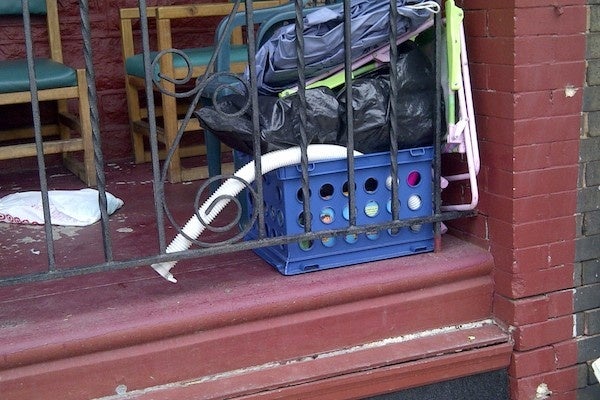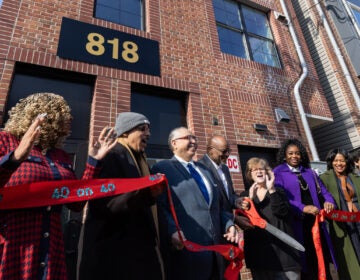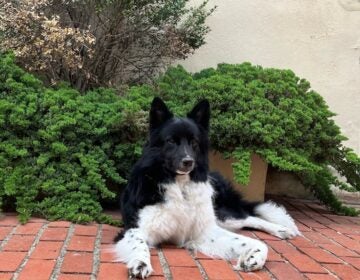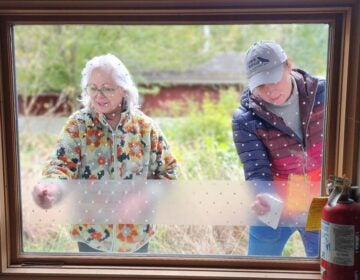Germantown homicide witness: ‘There was just too much blood. I knew he was dead.’
“His name was Bryan Keith Jones. His birthday was Dec. 5, 1964. He had no beefs with anybody.”
Those were the words spoken by Harley Brunson just before sunset on Monday while standing outside 62 W. Rockland St. in the city’s Germantown neighborhood.
If he had taken two steps backwards, Brunson would have been on the curb. In fact, he would have been on the exact spot where an unknown gunman unleashed a barrage of bullets that left 16 numbered yellow bullet-casing markers in the street Friday night into Saturday morning.
At least one of those bullets caught his friend.
A shot to the head.
Not even getting rushed to Albert Einstein Medical Center in the back of a police cruiser, instead of waiting for an ambulance, would save him.
Celebration turns tragic
Brunson knew all of this because he was on the front porch with Jones, two of Jones’ sisters and others listening to Motown, Stax Records and other oldies.
It was a post-party after an early evening kids’ fiesta, a good time after a heavy downpour.
The clock read 11:36 p.m. That’s when all hell broke loose. One sister had just walked inside; Brunson was standing by the porch steps; Jones was on the furthest of five chairs from the front door; and Jones’ sister Nita was sitting three feet closer to the safety of shelter.
“I saw a shirt, a red shirt, a pair of light pants and a gunshot. That’s when I tried to run inside,” recounted Brunson of the chaos that he didn’t see approaching.
“I had blood on my shirt and thought I’d been shot. I wasn’t,” he continued. “When I saw Bryan’s sister on the ground by the door, I thought she’d been shot, but she wasn’t either. She just fell when she was running inside. Then I didn’t see Bryan inside.”
Oh no, Brunson thought, did they get him?
“He was on the ground by the front door on the porch,” he said. “I went outside to try to pick him up to get him inside. I felt a heartbeat, but his body was so limp. There was too much blood. I knew he was dead.”
No hope
Shortly thereafter, when the bullets stopped echoing up the narrow block, a neighbor who is a nurse came out to tend to Jones. She too felt faint signs of life.
Witnesses reported that they heard a breath or some sort of sound from Jones. But then, the nurse started crying. That’s when Brunson’s initial suspicion was confirmed to others.
The scatter-shot placement of bullet markets on the front of the house, porch roof and beyond speaks to a sadistic blessing of timing.
If it had happened an hour earlier, children between the ages of 3 and 16 would have been out on that porch, right in the line of fatal fire.
If it had happened an hour earlier, this tale would not have gotten lost amid reports that an off-duty police officer had been hunted and killed six hours later.
Who he was in life
Talking to family, friends and neighbors, a story emerges about a beloved grillmaster and coffee-and-Red-Bull-fueled jokester who lived on West Rockland Street for 40 of his 47 years of life.
“He liked his coffee how he liked his women,” his sister Diane noted with a smirk.
“Black, no sugar,” Brunson chimed in as if on cue.
He put his 23 years of sobriety to good use helping those facing addiction, Diane said. A list of relatives’ and friends’ names was rattled off to that end.
They recall how he set up a beef grill and a pork grill for three or four barbecues already this summer; at the last one, he dispensed some BBQ tips to his sister Diane, who always demanded he grill the pork first. She’ll carry on that grilling tradition now.
She wondered aloud Monday night whether he had premonitions of his passing when she thinks about how “he just started eating cake, and what he wanted to eat” despite a strict diet that came about because of health concerns four years and 30 pounds ago (diabetes and high blood pressure, they explain).
Respected old-head status garnered “Uncle Bryan” enough cred to serve as a “lifeguard” for the neighborhood kids who cooled off in the plastic pool on the concrete outside Jones’ house.
On Monday, older sisters Diane and Helen laughed about how he dispensed love-life advice to neighborhood boys and girls, who would follow up for more guidance based on the reaction garnered.
“Everybody around here loved him,” Diane Jones said. “That’s why it’s so baffling to everybody. He’s more than just a number.”
A chaotic scene
Not even 72 hours have passed since Jones was gunned down.
Remnants of police tape were still tied to the fence of a neighboring property. There were no signs of blood, just a blue tarp crumpled up in a trashbag next to the recycling bin out front. The plastic pool that neighborhood youths played in sat empty; it leaned against the side of a porch where a man died.
There’s talk on West Rockland about static from other blocks filtering onto theirs. There’s talk of other neighborhood violence somehow following a vengeance trail to the house across the street from a school playground. But police had no better shooter description than a gunman wearing a red shirt and white pants.
For their part, Jones’ loved ones were concerned about two things beyond their grief: How they were treated in the aftermath and how a generation of young African-American men can be so downright cold.
To the former, Diane Jones decried how two officers hauled Bryan off the porch, each holding one arm and one leg, banging his head against a cement post before throwing his dying body into the back of the cruiser for the two-mile ride to Einstein, where he would be officially declared dead one minute before midnight.
“They said there was only one ambulance on duty for the area at that time and that it was on another call. They blamed budget cuts,” she said of police who arrived on the scene quickly. “Why didn’t they just tell us that from the beginning, so we could have driven him to the hospital right away instead of waiting a few minutes?”
Witnesses also decried how they were taken to the Roundhouse in the aftermath without knowing with any certaintly whether Bryan Jones had died.
“They were treating me like I was on ‘The First 48,'” Brunson said of the cable police-investigation documentary program. “They started treating us like we were criminals, saying we knew more than we were telling them. Good cop/bad cop.”
“And we’re grieving. We just wanted to know the status of our brother,” added Diane Jones.
Angry youths
To Helen Jones, who works in a behavioral-consultant capacity with the school district, her brother’s killing serves as further evidence of a lost generation.
The conversation hearkened back to the gang wars of the 1960s, the crack-cocaine epidemic of the 1980s and how today’s African-American males in their teens and early 20s have grown up surrounded by a culture that seemingly devalues life.
They grasped for seemingly impossible answers.
“They’re mad. They think there’s no place for them. They won’t talk about their feelings because they’re told they’re not tough if they do,” she said. “They feel unappreciated, and that hurts.”
They won’t forget
On Monday night, there were about 60 candles sitting inside 62 W. Rockland St. awaiting sunset.
They would be brought outside so just as many mourners could hold a vigil to their lost brother and friend just steps from where an unknown gunman apparently decided to indiscriminately open fire.
“He always used to say that the person who gets hurt didn’t have anything to do with the situation,” Brunson said. “Lo and behold, he’s the one who got hurt and didn’t have anything to do with the situation.”
His name was Bryan Keith Jones.
His birthday was Dec. 5, 1964.
He had no beefs with anybody.
He was gunned down on the unit block of West Rockland Street in Germantown after a rainstorm the night of Aug. 17.
Bryan Keith Jones was the 226th person murdered in Philadelphia in 2012.
WHYY is your source for fact-based, in-depth journalism and information. As a nonprofit organization, we rely on financial support from readers like you. Please give today.



